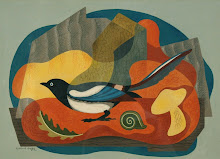Do you remember the aubretia
that we found at the bottom of Gold Hill?
It was named after the botanical artist,
Claude Aubriet (1651 - 1742).
 Citrullus Colocynthius
Citrullus Colocynthius
He worked in the Jardin des Plantes in Paris
and his paintings attracted the attention of
the influential Professor of Botany,
Joseph Pitton de Tournefort
who employed Aubriet to record the botanical discoveries
of his trip to the Greek Islands and the Levant.
 Flower Study
Flower Study
I am trying to imagine
a scientific expedition to Armenia in 1702;
it must have been like stepping back into
the Middle Ages for the cultured Parisians.
 Pomegranate
Pomegranate
Aubriet was appointed Royal Botanical Painter in 1707
and retired in 1735 but his meticulous detail
infuenced a whole new generation of artists.
 Geranium
Geranium
You can see Aubriet's illustrations
in the RHS Lindley Library.
I shall go and admire them when I have a spare moment
 Carnations
Carnations
Roll on that day.
that we found at the bottom of Gold Hill?
It was named after the botanical artist,
Claude Aubriet (1651 - 1742).
 Citrullus Colocynthius
Citrullus ColocynthiusHe worked in the Jardin des Plantes in Paris
and his paintings attracted the attention of
the influential Professor of Botany,
Joseph Pitton de Tournefort
who employed Aubriet to record the botanical discoveries
of his trip to the Greek Islands and the Levant.
 Flower Study
Flower StudyI am trying to imagine
a scientific expedition to Armenia in 1702;
it must have been like stepping back into
the Middle Ages for the cultured Parisians.
 Pomegranate
PomegranateAubriet was appointed Royal Botanical Painter in 1707
and retired in 1735 but his meticulous detail
infuenced a whole new generation of artists.
 Geranium
GeraniumYou can see Aubriet's illustrations
in the RHS Lindley Library.
I shall go and admire them when I have a spare moment
 Carnations
CarnationsRoll on that day.









11 comments:
Botanical illustrations are so beautiful and I love that, after a lifetime devoted to recording them, she had a plant named after her. Was she alive to enjoy it?
I LOVE Botanical illustrations, So beautiful.
I can't imagine seeing all those places and drawing all those beautiful plants and flowers, in that time period no less!
Again you have satisfied my nerdy art historian side :)
I once took a wonderful undergraduate seminar (could it *really* be twenty years ago?) in the art of bookmaking. It was taught in the Rare Book Room at Smith College, Northampton, Massachusetts, USA, which holds an extensive collection of herbals and botanical/natural history books. Spent many, many hours turning the pages, holding my breath in anticipation of the next illustration, the next description.
Oh my, what richness!
That experience has led to countless hours spent in other Rare Book Rooms and Special Collections. And whether the reading room is oak-tabled and leather-padded or gleaming with glass and chrome, crossing the threshold is one of the most magical things I know.
Thanks for the reminder, Alice. I've been away.
I had a try at doing Botanical illustrations, and it gave me a whole lot more respect for those pictures. What a divine way to spend your life?
Gorgeous.
In the Louvre it is possible to buy re-editioned etchings of botanical specimens, as well as grand flower arrangements. Did you see that when you were there, the print section? I could barely drag myself out last time I was there.
So beautiful!
Rosie
These are beautiful illustrations - I especially like the carnations. My grandfather had aubretia in his garden. When the sun shines on it it has a lovely peppery smell - whenever I catch a whiff I'm transported back 30 years and have the urge to wander off a find a tadpole in his pond or peep around his 'peepo' tree.
I was also going to say that I like the carnations. These are breathtaking. Thanks so much for sharing them!
Alice, You are a fount of knowledge. The illustrations are beautiful.
history of art one day and fishtank mishap another time...
I love visiting you.
I agree -- it must have been amazing.
I hereby declare MrsM Polymath 1st Class with knobs on
Post a Comment